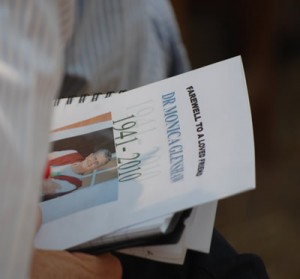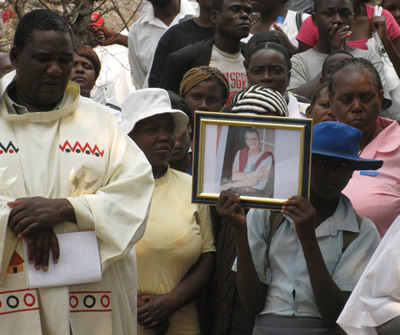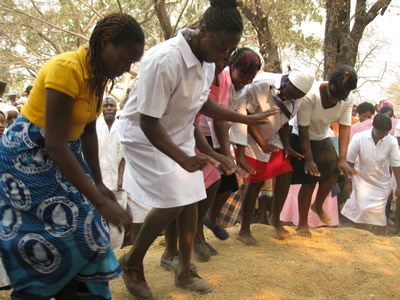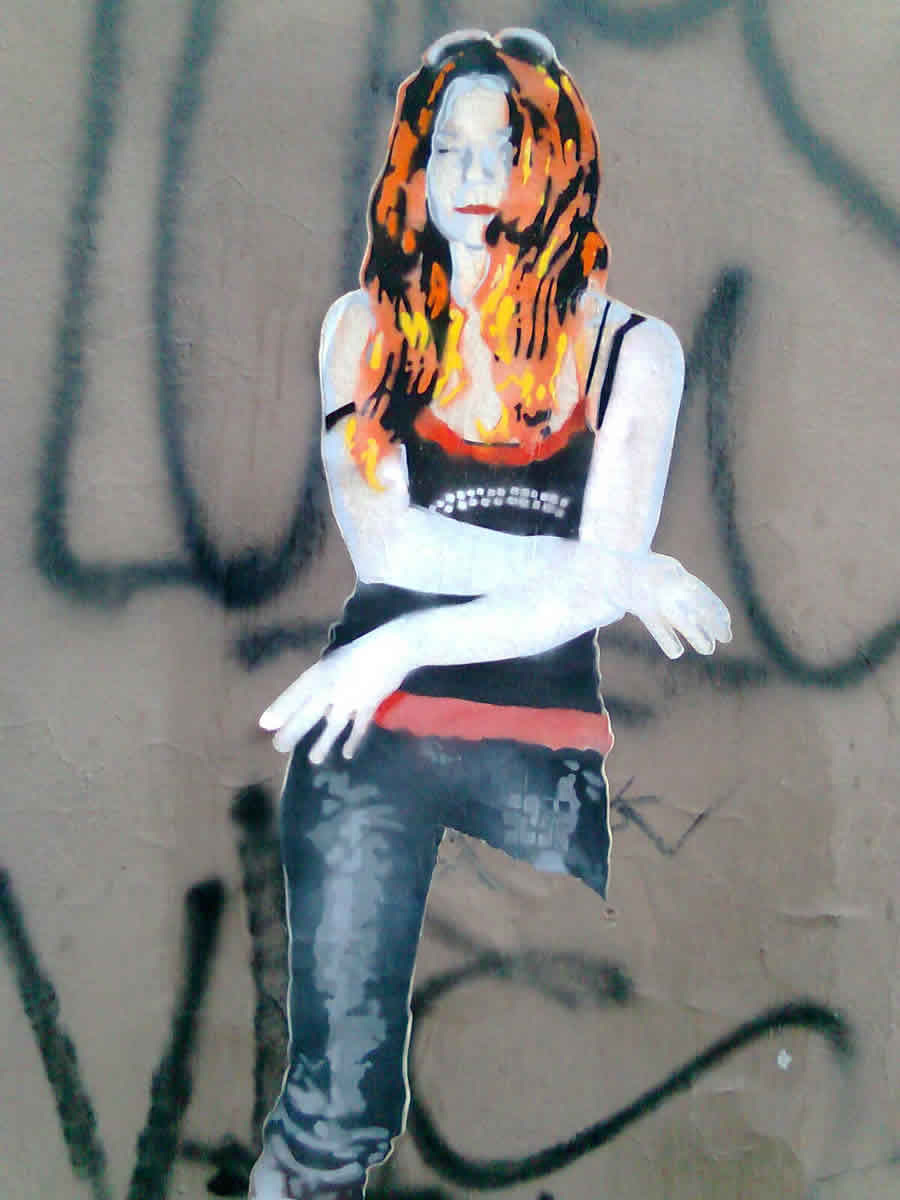Archive for the 'Inspiration' Category
A great farewell to an amazing woman
Sunday, September 26th, 2010 by Brenda Burrell
Funeral programme
Dr Monica Glenshaw, a friend for many years, died on Monday September 20th, weeks shy of her 69th birthday. When I heard the news, a day after her death, I felt the wind knocked out of me. I knew Monica was battling cancer but didn’t vaguely have a measure of how aggressive her adversary was. These past few days I’ve realised that there are a lot of things I didn’t know about Monica. She was a private and self-deprecating woman who kept the different areas of her life distinct from each other. Medical, family and social lives seldom intersected. But given that Monica was happy to answer direct questions directly, there are perhaps other reasons why I found myself so uninformed of her Amazing Achievements.
When she was in town, I think Monica was happy to put the responsibility and challenges of her rural hospital life out of her mind for a few days of R&R. She didn’t deflect questions about herself, she just seemed to slip her own in first. She was curious and interested in what we were doing in our personal and work lives, and would soon have me prattling away about my concerns and passions. I frequently made the mistake of not reversing the roles. Happily colleagues at Kubatana got her to answer one of their Inside/Out questionnaires in 2009, so we can go back and read a little about Monica, in her own words.
I met with some of Monica’s closest friends on Tuesday night. We were miserable but couldn’t help but spend quite a lot of the time laughing about Monica’s quirky side. She was a woman who travelled extremely light – partly because she needed very little and partly because she trusted others to deal with logistics when she wasn’t at work. On one occasion Monica arrived at an airport in Canada, visiting from Zimbabwe – all she had brought with her for the visit, was a clean pair of knickers and a gift for her friend!
On Wednesday afternoon I went to a memorial mass for Monica at the Lady of the Wayside Church in Mt Pleasant, Harare. We were an eclectic mix of family, artists, doctors, nuns, gay men, lesbians, human rights activists and many others. Monica’s brother Mike Glenshaw and her friend John Miller shared details of her life – some of it amusing, much of it illuminating.
I learned that Monica’s distinctive way of speaking was courtesy of a cleft palate, and that she had been hard of hearing since childhood. She wanted to be a vet but didn’t have good enough grades to pursue that dream. Instead she studied agriculture, and worked for a time as a dairy manager – or dairy maid as she liked to joke. After some years she realised that fulfillment lay elsewhere, and enrolled to study medicine at Wits University in Johannesburg. Appalled by the politics of the apartheid regime in South Africa, Monica moved to Zambia in the ’70s to practice medicine there. In 1985, a few years after Zimbabwe’s independence, she accepted a position as Medical Superintendent at Murambinda Mission Hospital, where she settled in for the long haul. Some years later she was appointed District Medical Officer for Buhera, and thereafter took on a workload meant for two.
That evening we gathered with more of Monica’s friends to have a few drinks and share how our lives had been enriched by hers. She loved a party and more than a few drinks, unwinding and socialising with her friends. Those of us who saw more of the off-duty Monica could be forgiven for overlooking the Fabulousness of her doctoring work. For some of her family it was a wonderful opportunity to learn about another side of Monica.
The following morning a group of us drove the 3+ hours down to Murambinda Hospital for her funeral and burial. It was to be a memorable experience for all of us.

Graveside
The turnout was amazing. The emotion and respect expressed by colleagues and friends from the medical side of her life was inspiring. Looking around at the school children who arrived to join the service after school ended, I wondered how many of them Monica had delivered, immunised, medicated or patched up during her 25 years at the hospital.
Present at the funeral were many hundreds of people, including hospital board members, nursing staff, mission staff, NGO partners, district police, friends, family, clergy, nuns, local business owners, community residents, the local chief, the District Administrator and Eric Matinenga, MP for Buhera. Speakers drawn from this assembly spoke of their huge respect for the enormous contribution Monica had made to the hospitals and clinics in her district, and the innovative public health initiatives she pioneered or supported. A spokesman for the Ministry of Health shared that practitioners from a variety of fields visited Murambinda to learn from the systems and methods in practise here. Speakers described Monica as a committed team player, mentor, visionary and leader in the field of rural medicine; as rigorous, forthright, brave,determined and tireless.

Dancers graveside
Monica lived in a simple, neat home on the hospital grounds and kept her personal possessions to a minimum. She had a famously limited wardrobe – as a friend recalled, the only thing to change over the years he knew her, was the colour of her fleecy.
Monica loved animals and became very attached to her dogs. A few years ago she was given a Jack Russell pup and the two quickly became inseparable. If Monica was coming to stay, so was Nutu – it was not negotiable. Monica must have had great peace of mind knowing that Nutu was going on to live with one of her closest friends.
There’s no doubt than many of us have been marked by Monica’s life and death. She had strong close bonds with colleagues, friends and family and all will sorely miss her company in the days ahead.
For more images from the funeral, follow this link.
Also, a lovely aggregation of Monica pics here.
Get your Chicken to Change ringtone
Wednesday, September 15th, 2010 by Amanda AtwoodOkay so it’s official. Freshlyground have been banned from performing in Zimbabwe next month because of their Chicken to Change video. I know it’s official because I saw it on ZA News. Those puppets don’t lie.
Meanwhile, I’ve just made the Freshlyground Chicken to Change song my ringtone. Maybe now I’ll look forward to people phoning me . . .
You can download the ringtone here.
MBIRA MBIRI
Tuesday, September 14th, 2010 by Bev Clark‘MBIRA MBIRI’ (Two Mbiras)
A concert by HOPE MASIKE featuring CHIWONISO MARAIRE.
Outdoor performance / full cash bar.
A truly rare experience of Zimbabwe’s most electrifying mbira songstresses in a mesmerizing fusion of traditional music, jazz and unexpected delights.
Supported by award winning visual artist, MASIMBA HWATI. CC $10.
FRI 17 SEPT, 2010 @ 7PM. ALLIANCE FRANCAISE, 328 Herbert Chitepo Avenue, Harare.
The Uncertainty of Hope: A book that reminds us who women are in Zimbabwe
Monday, September 13th, 2010 by Fungai MachiroriI don’t usually read a book and feel compelled to write about it.
But in the case of Valerie Tagwira’s splendid novel, ‘The Uncertainty of Hope’, I simply must.
The first time I heard about this novel was in 2006 when a visiting Danish friend doing her PhD research around Zimbabwean gendered discourse presented it to me during one of our lively discussions. This friend also had Tsitsi Dangarembga’s much-anticipated second book, ‘The Book of Not’ and in my excitement to lay hands on it, I chose the latter as my reading fodder instead.
And because I’d never really heard much about ‘The Uncertainty of Hope’ – or its author – I somehow never got round to reading it.
Over the last year however, I have managed to forge a good cyber friendship with Tagwira who always encourages me on to get my first novel completed – I’ve found her to be very gentle yet incisive in everything she says.
And it somehow gnawed away at me that I had never ventured into her own literary mind by reading her book. What, I wondered, did a practising medical doctor’s prose talk about?
And so last week I bought my copy of ‘The Uncertainty of Hope’ to find out.
What an amazing piece of literature!
If ‘Nervous Conditions’ was the narrative of womanhood and its myriad challenges for our newly independent Zimbabwe, then Tagiwra’s novel is the dominant gendered text for our nation’s 2000s – a time of social, political and economic crisis.
The novel’s protagonist, Onai, is a woman who suffers many dilemmas in her roles as wife, mother, breadwinner and ordinary Zimbabwean living through the harsh times of 2005 – where hyperinflation, queues for scarce commodities and the deathly effects of the misguided Murambatsvina operations colour the hopelessness of a once prosperous nation.
Onai, is also a victim of gross domestic violence and lives out an existence that is almost admirable in its absorption of so much pain and disappointment.
And what Tagwira does so well is to mirror her main character’s life against other women whose struggles are excruciating to various extents – Melody, the third year university student who is sleeping with a married man to raise her fees as well as get a taste of the life her family can’t afford; Emily, the compassionate doctor who’s torn, like many potential Diasporans, between obeying her conscience and staying home, and departing overseas to receive second-class treatment while earning enough to live comfortably; and Sheila, the sex worker who’s contracted HIV and worries about her young child’s future without a mother because long waiting lists bar her from getting access to life-prolonging ARVs.
This novel may be set during a particular era in our history – a time when we were all once meaningless millionaires – but it still speaks to the issues that affect Zimbabwe’s women five years later.
And Tagwira definitely understands the subject matter well. Many passages in this 363-page journey had my skin swelling up in goose bumps because yes, here is a woman who speaks about the things we are not often too ready to acknowledge, and therefore address.
Here is one such passage which takes place early in the novel as Onai encounters a wave of depression due to the fact that no one understands why she cannot leave her abusive husband:
She would not be able to bear the shame of being a divorced woman. How could she possibly face a world that despised divorcees; looked down on single mothers? Marital status was everything. It did not really matter how educated or otherwise skilled a woman was. A woman’s worth was relative to one man, her husband: westernised values about women surviving outside marriage held no authenticity mumusha (in the home). In her whole extended family, nobody had ever had a divorce. She would not let herself be the first.
This book is not a patchwork of fanciful writing. It is gritty, heart-wrenching, enlightening, warming – and all carefully controlled by a credible and clever storyline that allows for the forces of life to bring together, as well as separate, its various characters.
I wonder, sadly, why Tagwira has not received the same acclaim for this breathtaking tale as have the Dangarembgas, Gappahs and Veras of our women’s writing world.
What a massive pity.
I only hope though that by your reading this short account of my experience, which I sadly can’t provide all the finer details of (lest I begin to ramble!), you too will pick up if this amazing novel if you have not already.
So many discussion points, innumerable advocacy issues, a whiff of the pungency of a decadent and decaying Zimbabwe – and all in well-written and engaging prose.
You simply must read this book and crown a true Zimbabwean heroine.
Remembering victims of Zimbabwe’s Gukurahundi genocide
Friday, September 10th, 2010 by Amanda AtwoodIn honour of his 50th birthday year, blogger and social commentator Rejoice Ngwenya launced the 2010% campaign in March.
In June, he said it was confession time, and demanded redress for the atrocities of Gukurahundi.
Celebrating his 50th birthday today, Rejoice sent us the piece below.
On a day, today, 10 September 2010, that I turn exactly fifty [50] years old, I would like not just to celebrate life in abundance, but also take a twenty-four hour ‘moment of extended silence’ to ponder over those who lost their lives.
In particular, I grieve with my sister Doreen whose daughter Tracey passed on under the cruel pain of leukaemia in England. Moreover there are those twenty thousand citizens of Matebeleland and the Midlands provinces of Zimbabwe – some of which I have heard of – Moliat Ndlovu, Cwayi Bhebhe, Charles Loxton, William Loxton, Dayan Loxton, Gifford Matandaware et al – who perished in the 1980s under the bayonet of Gukurahundi. Mr and Mrs [Luke] Khumalo, the intellectual couple of Tekwani High School, Plumtree, Zimbabwe, are yet to be accounted for, having given their entire lives to impart knowledge on thousands of young people.
My question: at a time when the coalition government of Robert Mugabe, Morgan Tsvangirayi and Arthur Mutambara pretend to offer the people of my country a chance for peace, why are the perpetrators of the heinous and barbaric acts of Gukurahundi still roaming free? ZANU-PF, under whose control the blood-thirsty North Korean-trained Fifth Brigade chose to waste innocent lives, has yet to confess its crimes against humanity. On a day, today, 10 September 2010, that I turn exactly fifty [50] years old, thirty [30] of those having lived under a brutal authoritarian dictatorship, I would therefore like to propose that ZANU-PF show their remorse by acknowledging that they were wrong, and instead of concentrating on further violating the liberties of white commercial farmers and black human rights defenders, invest money and time in financing a monument at Entumbane, Bulawayo, Zimbabwe – so we can forever remember those whose lives they needlessly took. In celebrating life, I therefore acknowledge the existence of death.
How will you make your birthday a day of action?












